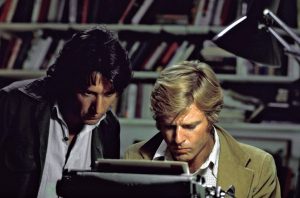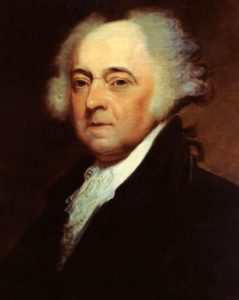I vividly remember the first week of my high school journalism class. I already fancied myself a writer and was chomping at the bit to get started, bursting with story ideas and clever headlines for The Wildcat Howl. At the time, I was all but settled on journalism as a career choice and had built the industry up in my head as this glamorous calling. When I grew up, I wanted to be a snappy lady wearing a pencil skirt and a press badge, barging to the front of the crowd to ask the hard hitting questions and get the scoop.
My enthusiasm stalled slightly when my journalism teacher rolled the tube TV and VCR to the front of the class, and without much preamble, popped in All the President's Men. It turns out she knew exactly what she was doing (shout out to Ms. Young!) because that’s when everything changed.
That’s when I came to appreciate the true power of the press and the world of investigative journalism. Watching Robert Redford and Dustin Hoffman portray Woodward and Bernstein, I remember thinking, “Wow, this isn’t very glamorous at all,” as they fought with their editor over deadlines and sources. But then they exposed Watergate, basically single handedly forcing the resignation of a sitting American president, and it all clicked. I mean, what’s sexier than blowing the whistle on a corrupt government?
The media has taken a beating, and not just in recent years. The free press has been vilified since its inception. You may heard of the 1798 Sedition Act. That was a law signed in by the second president of the United States, John Adams, stating that publishing anything critical of the government was illegal. Yikes. Thomas Jefferson righted this wrong in 1800, but since then there has been a long list of American politicians and government officials who have had a strained relationship with the media. In spite of that tension, or perhaps because of it, the free press (and particularly investigative reporting) was, is, and always will be one of democracy’s most powerful weapons.
And there are still journalists out there doing great work. In the newsroom, and in their “down time” when they write books about the historic, social, economic, and humanitarian issues they care about, shining a light on causes that those of us in a bubble of privilege might never even know of. Here are just a few of my favorites written by journalists and in our collection here at LPL.
The Immortal Life of Henrietta Lacks by Rebecca Skloot
Skloot, an award winning science writer, uses her considerable skill as both an investigative journalist and storyteller to tell of Henrietta Lacks, a woman whose contributions to science and medical advancements have been largely untold. In 1951, cancerous cells were taken from her cervix without her consent or even knowledge, and eventually led to some of the biggest medical breakthroughs of the age. They were thereafter known as HeLa cells. The woman they came from died and was forgotten. This book dives deep into the obvious ethical dilemmas at play, but also doesn't shy away from tackling the topics of race, inequity, and the deeply personal story of what HeLa means to the family Henrietta left behind.
In Cold Blood by Truman Capote
Truman Capote and this transcendent true crime story are known for changing the face of journalism through the advancement of what fellow author Tom Wolf coined as "New Journalism" and what Capote himself called the "nonfiction novel". In Cold Blood uses a type of first person narrative usually found in fiction to tell the story of a murdered family in Holcomb, Kansas and their convicted killers. He was able to humanize the victims, the investigators, and even the killers in a way that had never been seen before, but is now a popular way to tell true crime stories because of the added empathy it invokes.
Personal History by Katharine Graham
Katharine Graham tells her own story of trailblazing in this memoir, chronicling her early life, all the way through her husband's suicide and her appointment as president and publisher of The Washington Post. She was the first female Fortune 500 CEO and presided over The Post during the Watergate Scandal, when she refused to back down to pressure and even threats from government officials about the publishing of the Pentagon Papers.
Dopesick by Beth Macy
A reporter for The Roanoke Times for 25 years, Beth Macy tackles the opioid epidemic in this dark but important story of a country at war with an enemy from within. She tells the startling history of what is now rampant opioid use, going back decades to a time when Americans began to be over prescribed addictive painkillers for the sole benefit of greedy pharmaceutical companies. She then follows the families of addicts and first responders as they grapple with the crisis, exposing a surprising truth: Opioid addiction does not discriminate based on class, and is one social issue that has infiltrated every corner of American life.
Charged by Emily Bazelon
Bazelon is a staff writer for The New York Times, as well as a senior research fellow at Yale Law School. This book focuses on mass incarceration caused by an imbalance of power in our justice system, one tipped to the prosecutors in almost every case. Bazelon's legal expertise masterfully walks us through the cases of two young people, from arrest to conviction and everything in between, exposing the deep rooted problems. But also providing a glimmer of hope in the form of more progressive DAs being elected in major cities across the US, slowly making the disruption of a broken system possible.
For a longer (although not comprehensive) list of works by journalists in our catalog, click here.
-Leah Newton is a Readers' Services Assistant at Lawrence Public Library.





Add a comment to: The Mighty Pen